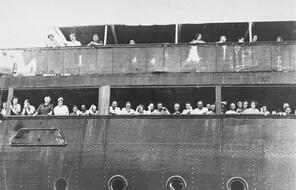Breadcrumb
Teaching The Children of Willesden Lane: Upstanders and Bystanders
At a Glance
Language
English — USSubject
- History
- Social Studies
- The Holocaust
Teaching The Children of Willesden Lane: Upstanders and Bystanders
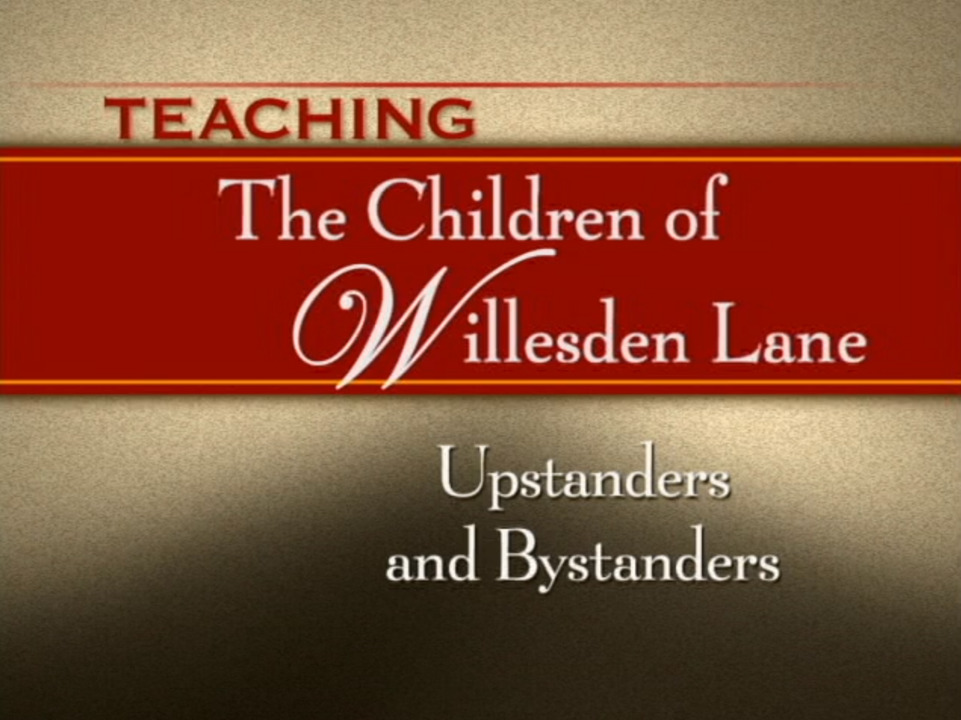
[MUSIC PLAYING]
I think doing a study of the Holocaust makes a lot of sense from the standpoint of first, understanding that suffering does not belong to just one group. That at different points in history, different groups have suffered. And that there is a universality to situations where people perpetrate evil on other people.
Also, teaching the vocabulary of bystander, upstander, victim, perpetrator gives them a vocabulary that when we go into the Jim Crow era, we have vocabulary to attach so that they can express themselves emotionally, but in control.
OK, I want you to think about what we do when we stand by. If we stand by, let's say someone out here gets into a fight and we stand here. What, essentially, what activity do we have in that fight?
Bystanders, cause we're not helping them.
OK, we're not helping them. We're also not?
Trying to break it up.
Trying to break it up or stop it.
If those are bystanders, what are upstanders? Chris?
They see it going on, and they try to stop it. They stand up for the person.
All right, they stand up for that person. All right, what about the term victim? What is a victim?
The person or the people who the conflict or the problem is being against. The people that are probably being hurt or probably an innocent person.
An innocent person who is being hurt. An innocent person who is being hurt. Class, what I want you to look at, is perpetrator, perpetrator. Now, if you've watched very much Law & Order, you know about perpetrator. So what do you think a perpetrator is? William?
The cause of the problem or the situation.
They're causing the problem.
Something bad against the victims.
OK, they're doing the bad thing to the victim. All right, now I want you to go to this book. Children of Willesden Lane, and I want you to think about, who in that book might be a bystander? Who in that book might be a bystander?
It's going to be easier to come up with the upstander, isn't it?
Yes.
So tell me who the upstander in this book is? We've got some, don't we? William?
The lady who took her, even though she had a-- she was overcrowded in her house.
OK, another upstander?
Lisa?
What makes you think Lisa was an upstander?
Because she tried to bring her family to London.
As many times as I've read this book, I think you're the first person that saw Lisa as an upstander, but she was an upstander.
A bystander was the piano teacher because he just stood by and when she went to her rehearsal or practice, he said that he couldn't teach her anymore. So that meant that he couldn't do anything about it. He was just standing by and let the Nazis attack all the Jews.
OK, all right, so he didn't stand up. He was not an upstander for her. He was a bystander.
In a middle school, these students face every day, situations with peers where they see victimization, where they see perpetrators, where they see bystanders, where they have to make a choice about whether to be a bystander or an upstander. And I want them to be able to judge when is the right time to take a stand, when will it make a difference to place myself on that line. And when must I stand up. Those are good lessons, good citizenship lessons, for middle-school students.
I want to give you a piece of a legislative bill that was taken to Congress. It was the Wagner-Rogers bill. I want you to read it silently. And I'm going to come back and ask you some things about the Wagner-Rogers bill.
Here it is. This is what it says. You read silently. I'll read orally. In the early 1920s, the United States passed laws that strictly limited immigration. After the violence of Kristallnacht, Senator Robert F. Wagner of New York and representative Edith Nourse Rogers of Massachusetts, introduced a bill that would bypass those laws to admit, temporarily, 20,000 Jewish children under the age of 14.
The children would be allowed to stay in the country only until it was safe to return home. Various Jewish groups in the United States would assume the cost of sheltering them.
Now, this was actually broken down so that in one year, 10,000 would come and in the next year, another 10,000 would be added. I want you to think like congressmen of that time period. And I want you, as a group, to determine a plus list, why we should admit them, and a minus list, why we should not admit them.
And I want you to think about what was going on in the country at the time. I want you to think like people of that time period. I'm going to give you about two minutes. So I need someone to record. You can record right on this sheet of paper. And I need everyone else telling reasons, plus and minus.
When the students are working in small groups, what I want to hear, is language that tells me that they're putting together the historical fact in such a way that they're beginning to make sense of the flow of events.
What's going on in 1938? What are we dealing with?
In America?
Uh-huh.
After all the Wall Street, the economy had gone down.
The Great Depression.
The Great Depression. And so why might that affect whether we bring these children in or not?
Because the money wages were getting low, and we maybe could not care or provide for these kids.
Maybe someone is going to argue that the economy-- are there poor children in America at this time?
Yeah,
So what else might somebody argue?
How can we help other children if they can't help their own children.
There you go. Write it down.
What are some pluses? What would be some good things to help them come over? Maybe they can help out?
Maybe we'd be helping them in the process because maybe they don't have nothing back in--
When we were talking about the Wagner-Rogers bill, I was thinking, if I was at Congress, I would more likely voted to let the children in because I would see the other side, their safety. They have nothing to do with it. It's not the Jewish children's fault if Hitler was crazy. It wasn't their fault.
I've got the last half of what happened to that bill in my hand. I want to give it to you and let you see what America's response was. And then I want us to talk as a whole group for just a little while about why America-- we need to pull together some of those reasons why America may have had the response that they did.
OK, here's what it says. The bill encountered opposition from the start. Some Americans asked why it did not include Christian children from Poland, or China. Japan had invaded China in 1933. Others made antisemitic remarks. The bill never passed.
So let's look at some of your reasons that you were thinking about, and let's list them. What I need you to do, is tell me some of the reasons that were given for not supporting this bill. And I'm going to tell you if those reasons were accurate or not. OK, WIlliam?
Probably for jobs. Jobs and shelter,
Jobs.
Homes and shelters.
Shelter, why would that be a problem?
Because at the time, it was the Great Depression, they have most low those resources.
OK, what else had happened? Britney?
Retribution, they maybe didn't want to get involved with the Nazis or with Hitler during the time period.
They might have been afraid of retribution. After all, hadn't been that many years since they had been in the middle of World War I. So politicians were promising we're not going to get involved because if we do, we'll be in some sort of a war, and we'll have to pay for it.
And I'm going to tell you, also, that in this country, at that time, there were people that this didn't sound so outlandish to. That the idea of Jewish people being treated in this manner, didn't seem so outlandish.
My role is to provide historically accurate information, but primarily, to get them thinking.
So as individuals, you're powerful people. Individuals got countries involved. You need to remember that. Next time that we have a major election, you're going to be old enough to vote.
What I want them to understand when we finish is, that we might be a bystander in one instance, but in another instance, we might choose to be an upstander. And that that doesn't necessarily have to be who we are always. That we move in and out of these roles and that nations do that too.
[MUSIC PLAYING]
Teaching The Children of Willesden Lane: Upstanders and Bystanders
You might also be interested in…
Dismantling Democracy
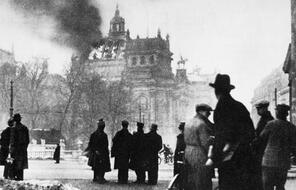
Do You Take the Oath?
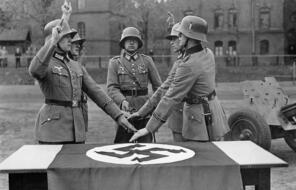
European Jewish Life before World War II
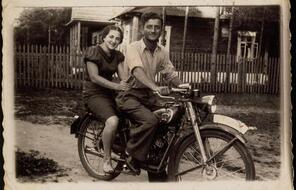
Exploring Identity

The Holocaust: Bearing Witness
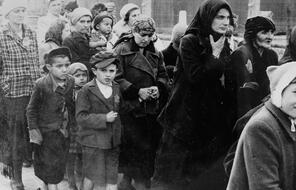
How Should We Remember?

Introducing The Unit

The Holocaust: The Range of Responses
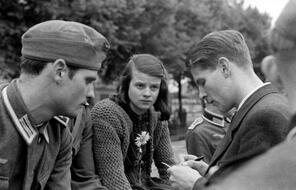
Kristallnacht
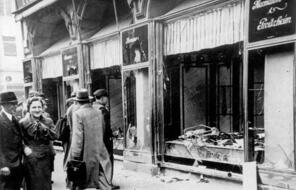
Laws and the National Community
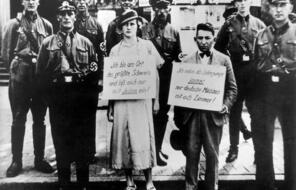
The Power of Propaganda
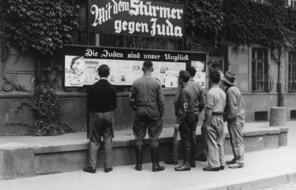
Responding to a Refugee Crisis
